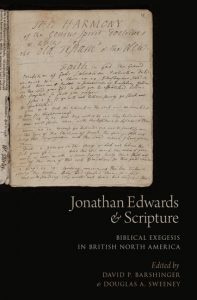“Jonathan Edwards and Scripture” Book Notice

Over the past few years, I’ve had the privilege of working with Doug Sweeney in putting together a new multicontributor volume on Edwards and the Bible, and I’m pleased to say that the book is now available. The volume is titled Jonathan Edwards and Scripture: Biblical Exegesis in British North America (New York: Oxford University Press, 2018), and it includes contributions from a number of Edwards scholars who have helped further the conversation on this important topic.
The book builds on the work that Sweeney, especially, has done over many years in the form of lectures, articles, and books, culminating in his Edwards the Exegete: Biblical Interpretation and Anglo-Protestant Culture on the Edge of the Enlightenment (Oxford University Press, 2015)—see my review of it here. It also furthers some of my research on Edwards, particularly in my book Jonathan Edwards and the Psalms (Oxford University Press, 2014).
To give you a taste of this new volume, here’s an excerpt from my introduction to the book:
Jonathan Edwards was a devout student of the Bible. The evidence for this dedication is undeniable. Rather than sidestep or mute the role of the Bible in his thinking, scholars would benefit from engaging it more intentionally and carefully. It is our hope that Jonathan Edwards and Scripture will help students of Edwards explore his vast engagement with the Bible by examining Edwards’ exegesis from several vantage points. Our aim is for this book to give readers a valuable foray into Edwards’ interpretation of Scripture by describing his exegetical context, offering close case studies of his actual exegesis of various texts and genres of the Bible, analyzing his use of Scripture in developing his theology, and gaining perspective on his biblical interpretation in comparison with other exegetes.
Even as new monographs are emerging on Edwards’ engagement with the Bible—one of the most important and fruitful areas of research in Jonathan Edwards studies today—much work admittedly remains to be done. This book will succeed if it not only brings a degree of clarity to our understanding of Edwards and the Bible but also encourages others to wade into his sea of biblical materials, seeking to better grasp what it means to call Edwards a biblical interpreter.
Jonathan Edwards clearly stood within the sola scriptura tradition of the Reformation. Even as he constructed theological concepts in ways that built creatively on those earlier formulations, and sometimes even explored new directions, Scripture remained in his mind the supreme authority for theology. Studying Edwards as exegete illuminates not only our understanding of the man and his thought but also the legacy of Luther and the sola scriptura principle that was so central to the sixteenth-century reform and eighteenth-century revival movements. As readers come away from this volume, with all the continuities and discontinuities across the chapters, it is hoped that scholars and general readers will in the future avoid brushing past what animated Edwards in so much of his work—the Christian Scriptures. (12–13) For a further preview, here is the list of essays included in the volume:
Introduction: David P. Barshinger
Chapter 1: Kenneth P. Minkema, “Jonathan Edwards’ Scriptural Practices”
Chapter 2: Stephen R. C. Nichols, “Jonathan Edwards’ Principles of Interpreting Scripture”
Chapter 3: Adriaan C. Neele, “Early Modern Biblical Commentary and Jonathan Edwards”
Chapter 4: Charles E. Hambrick-Stowe, “Language of the Heart: The Bible in Jonathan Edwards’ Personal Life and Spiritual Practice”
Chapter 5: Jan Stievermann and Ryan P. Hoselton, “Spiritual Meaning and Experimental Piety in the Exegesis of Cotton Mather and Jonathan Edwards”
Chapter 6: Mark A. Noll, “Jacob Wrestling with “a Man”: Jonathan Edwards and Contemporaries on Genesis 32:22–32”
Chapter 7: Robert E. Brown, “Jonathan Edwards’ French Connection: The Pentateuch and the Practices of Public History”
Chapter 8: Ava Chamberlain, “A Fish Tale: Jonathan Edwards and Cotton Mather on Jonah’s Whale”
Chapter 9: Michael J. McClymond, “‘Of His Fullness Have All We Received’: Johannine Themes in Jonathan Edwards’ Interpretation of Scripture”
Chapter 10: Stephen J. Stein, “Jonathan Edwards’ Reflections on the Virgin Mary”
Chapter 11: James P. Byrd, “Jonathan Edwards, War, and the Bible”
Chapter 12: David W. Kling, “Jonathan Edwards, the Bible, and Conversion”
Chapter 13: Gerald R. McDermott, “Was Jonathan Edwards an Evangelical? Scripture and Tradition in America’s Theologian”
Conclusion: Douglas A. Sweeney
For me, it was a privilege working with such a talented group of Edwards scholars, and it is great to see the book now in print. It is my hope that others will find Jonathan Edwards and Scripture to be beneficial in their understanding of Edwards, his theology, and his legacy.


